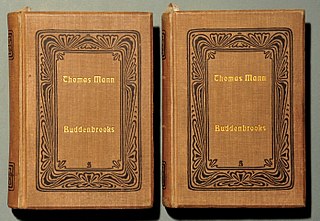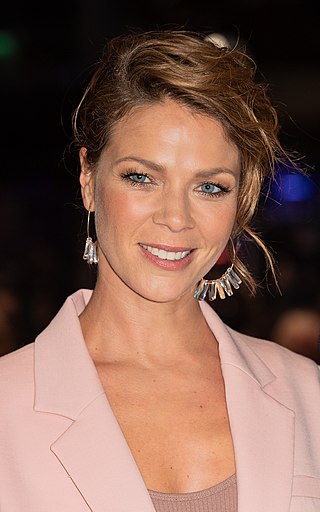
Paul Thomas Mann was a German novelist, short story writer, social critic, philanthropist, essayist, and the 1929 Nobel Prize in Literature laureate. His highly symbolic and ironic epic novels and novellas are noted for their insight into the psychology of the artist and the intellectual. His analysis and critique of the European and German soul used modernized versions of German and Biblical stories, as well as the ideas of Johann Wolfgang von Goethe, Friedrich Nietzsche, and Arthur Schopenhauer.

Buddenbrooks is a 1901 novel by Thomas Mann, chronicling the decline of a wealthy north German merchant family over the course of four generations, incidentally portraying the manner of life and mores of the Hanseatic bourgeoisie in the years from 1835 to 1877. Mann drew deeply from the history of his own family, the Mann family of Lübeck, and their milieu.

Travemünde is a borough of Lübeck, Germany, located at the mouth of the river Trave in Lübeck Bay. It began life as a fortress built by Henry the Lion, Duke of Saxony, in the 12th century to guard the mouth of the Trave, and the Danes subsequently strengthened it. It became a town in 1317 and in 1329 passed into the possession of the free city of Lübeck, to which it has since belonged. Its fortifications were demolished in 1807.

Júlia da Silva Bruhns was the wife of the Lübeck senator and grain merchant Thomas Johann Heinrich Mann, and also mother of writers Thomas Mann and Heinrich Mann.

Jessica Schwarz is a German actress.

Helen Tracy Lowe-Porter was an American translator and writer, best known for translating almost all of the works of Thomas Mann for their first publication in English.

Liselotte Pulver, sometimes credited as Lilo Pulver, is a Swiss actress. Pulver was one of the biggest stars of German cinema in the 1950s and 1960s, where she often was cast as a tomboy. She is well known for her hearty and joyful laughter. Her films outside of German cinema include A Time to Love and a Time to Die (1958), One, Two, Three (1961) and The Nun (1966).

Helga Feddersen was a German actress, comedian, singer, author, and theater director.
Uwe Kliemann is a retired German football player and coach. As a player, he spent 11 seasons in the Bundesliga with Rot-Weiß Oberhausen, Eintracht Frankfurt, Hertha BSC and Arminia Bielefeld. He represented Germany once, in a friendly against Netherlands.

The Hanseaten is a collective term for the hierarchy group consisting of elite individuals and families of prestigious rank who constituted the ruling class of the free imperial city of Hamburg, conjointly with the equal First Families of the free imperial cities of Bremen and Lübeck. The members of these First Families were the persons in possession of hereditary grand burghership of these cities, including the mayors, the senators, joint diplomats and the senior pastors. Hanseaten refers specifically to the ruling families of Hamburg, Lübeck and Bremen, but more broadly, this group is also referred to as patricians along with similar social groups elsewhere in continental Europe.

Alexander Fehling is a German film and stage actor. He is best known for portraying Master Sgt. Wilhelm in the 2009 Quentin Tarantino World War II film Inglourious Basterds, and as Jonas Hollander season 5 in the Showtime original series Homeland as the boyfriend of Claire Danes's character Carrie Mathison.

Hansjörg Felmy was a German actor.

Heinrich Breloer is a German author and film director. He has mainly worked on docudramas related to modern German history and has received many awards. Breloer's 2005 docudrama Speer und Er was described as a milestone in the understanding of Nazi Germany by the German people.

Gernot Roll was a German cinematographer, film director and script writer. He collaborated on several films with directors Edgar Reitz and Sönke Wortmann. He was regarded as an expert on literary adaptations and film biographies, such as The Buddenbrooks, filming Thomas Mann's novel in eleven television episodes directed by Franz Peter Wirth, and the same work again in 2008 in the film directed by Heinrich Breloer.

Buddenbrooks, released also as Buddenbrooks: The Decline of a Family, is a 2008 German drama film directed by Heinrich Breloer, adapted from the 1901 novel of the same name by Thomas Mann. Set in the 19th century, the film portrays the decline of a wealthy family of grain merchants in Lübeck, the Buddenbrooks, and with them a whole way of life as Germany changed radically. It stars Armin Mueller-Stahl as the family's patriarch Consul Jean Buddenbrook, Iris Berben as his wife Bethsy Buddenbrook, and Jessica Schwarz, Mark Waschke and August Diehl as their children Tony, Thomas, and Christian Buddenbrook, respectively.

The Buddenbrooks is a 1923 German silent film directed by Gerhard Lamprecht and starring Peter Esser, Mady Christians, and Alfred Abel. It is based on Thomas Mann's 1901 novel The Buddenbrooks.
This is a list of German television related events from 1979.

The Buddenbrooks is a 1959 West German drama film directed by Alfred Weidenmann and starring Liselotte Pulver, Hansjörg Felmy, Nadja Tiller. It was released in two parts. It is an adaptation of the 1901 novel of the same name by Thomas Mann.
Margarethe Jochimsen, née Müller, was a German curator, art critic and museum director.
The Houseboat is a 2021 German docuseries released on Netflix on March 9, 2021, starring Fynn Kliemann and Olli Schulz.
















